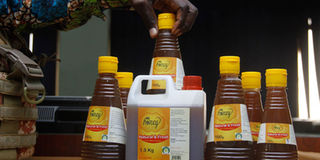Honey does not meet EU quality standards - expert

A honey trader displays products. Uganda currently harvests only one per cent of a potential 500,000 tonnes of honey per year. PHOTO BY Abubaker Lubowa
What you need to know:
Despite being only one of five countries in sub-Saharan Africa licensed to export honey to the European Union, Uganda has failed to meet home-grown demands for honey, and export to this market, Ismail Musa Ladu writes.
Bee keeping and honey production have the potential to unlock the resurgent economy if only policy makers give it the attention it deserves, industry value chain players and a team of researchers have said.
Despite the large economic potential for the country’s organic honey, it is still difficult to produce and market the nutritious commodity both within and beyond the borders.
As a result, the contribution of honey to the economy has not generated the kind of buzz that commodities such as coffee, tea and tobacco has produced.
Research by researchers from Ghent University estimates that Uganda currently harvests only one per cent of a potential 500,000 tonnes of honey per year. Despite being only one of five countries in sub-Saharan Africa licensed to export honey to the European Union, Uganda has failed to meet home-grown demands for honey, and export to this potential market.
According to the executive director of Uganda National Apiculture Development Organisation (TUNADO), Mr Dickson Biryomumaisho, this is so because value chain actors have not gotten the kind of help and intervention that sectors such as agriculture receive in terms of free inputs and tax waivers.
Speaking during the national honey week, Mr Biryomumaisho said with due attention given to the honey industry, the sub-sector is capable of addressing the unemployment question, reawakens the hibernating economy and generates foreign exchange.
“We represent over 100,000 farmers. The industry exports natural honey (beeswax) worth $1.2 million (about Shs4.5 billion) annually. The good news that we have capacity to generate more than $6 million (about Shs22.6 billion) and we can triple our production if we get the right kind of support and marketing of our organic honey.”
Challenges
It emerged that people have not embraced bee keeping and production because it is still being thought of as a wild or risky adventure with stinging bees.
“Bee-keeping is still being thought of in the traditional sense where you go hunting for it rather than an income-generating activity,” Mr Biryomumaisho said.
Way forward
Industry players Prosper Magazine spoke to proposed that the apiculture policy is needed. With the policy in place, the sub-sector will be entitled to a budget which if used well, would drive the fortunes of the industry forward. The standard body also needs to do the certification to unlock the much-sought after market.
Like several exemptions extended in agricultural machineries and equipment, Mr Biryomumaisho urged government to consider granting tax waivers on bee hives, bee wax extractor and processing tanks among other facilities.
Researchers’ take
According to research by Guy Smagghe of Ghent University, there is need for more training in good beekeeping practices and controlling diseases.
CURRENT STATE
According to Agriculturist magazine, traditional methods of bee keeping are still predominant in Uganda where it remains an important seasonal activity in many regions. But hives are usually destroyed and colonies killed in the process of collecting honey. Contamination and fermentation of honey is also common.
Despite the diversity of vegetation suitable for bees in the region, a shortage of bees means that beekeepers are dependent on collecting swarming bee stock. The current shortage is also limiting production of honey and by-products for which there is considerable potential.




